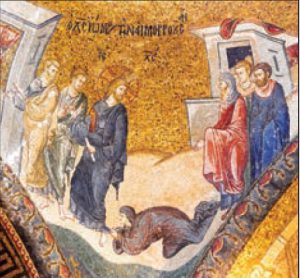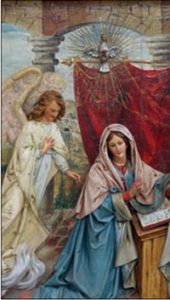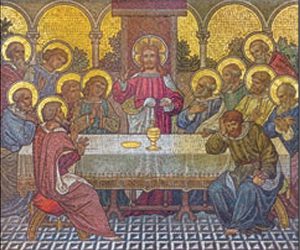The ‘Diaconate Mysteries’
Meditating upon the role of deacons through the Rosary
Deacon Jim Meyer 1
Contemplative prayer is a prayer of silence — an experience of God’s presence. It is the opening of our minds and hearts — our whole being — to God. This goes beyond thoughts, words and emotions. The Rosary is a form of contemplative prayer. It teaches us about the virtues of Jesus and Mary and leads to mental prayer and a desire to imitate Our Lord.
In October 2002, Pope St. John Paul II marked the 24th anniversary of his election to the papacy by signing the apostolic letter Rosarium Virginis Mariae (“The Rosary of the Virgin Mary”) during his weekly general audience. He said that “the Rosary is a powerful prayer for peace, for families and for contemplating the mysteries of Christ’s life.” The pope encouraged the addition of five new “mysteries of light” — moments from Jesus’ public ministry — to further underline the Rosary’s focus on Christ. He went on to say that “while reciting the Rosary involves repetition, its goal is contemplation and concentration.” He suggested people read a Scripture passage related to each mystery as a way of “allowing God to speak.” He said an essential part of contemplative prayer is silence.
Our Blessed Mother was the first Christian disciple to practice contemplation frequently. In Luke 2:16-20, the shepherds pay Mary a visit. They tell her and others all that was told to them by the Angel Gabriel, and they were amazed. St. Luke writes that “Mary kept all of these things, reflecting on them in her heart” (v. 19). When Jesus was 12 years old, he inadvertently was left behind in Jerusalem after the feast of Passover and later found in the Temple. Again, “His mother kept all these things in her heart” (Luke 2:51). Mary must have had many opportunities to ponder the meaning of the events in Jesus’ life. Of course, she had the distinct advantage of being able to ask questions of her son.
Why is it important to ponder the events in the life of Our Lord? Isaiah 55:8 says: “For my thoughts are not your thoughts nor are your ways my ways.” We are not capable of grasping everything that God does in our world. We need silence and time to ponder the real meaning of these occurrences. The question that we need to ask ourselves is this: What is God saying to me through these words and events in my life?
The following diaconate Rosary meditations are meant to combine the contemplative aspect of the Rosary, the pondering of our Blessed Mother, with the central aspect of our call to the diaconate — that is, service. Deacons are ordained as a sacramental sign to the Church and to the world of Christ, who “did not come to be served but to serve” (Mt 20:28).
The entire Church is called by Christ to serve, but the deacon, in virtue of his ordination and through his various ministries, is to be a servant in a servant-Church. As ministers of charity, deacons are leaders in identifying the needs of others, then assembling the Church’s resources to meet those needs. Deacons also are dedicated to eliminating the injustices or inequities that cause such needs. Jesus told us how important this service is, and he showed us how to do it. May we be bold and zealous in standing up for the rights of the poor. May we also be gentle and kind as we show them God’s love.
Let us make time each day to ponder with Mary by praying the Rosary. As Pope John Paul II said, the goal of the Rosary is contemplation and concentration. Reading Scripture related to each mystery is a way of allowing God to speak to us. We must have times of silence in our lives to contemplate. Pope Benedict XVI said we must maintain “consideratio — discretion, deeper examination, contemplation, time for interior pondering and vision, remaining with God and meditating about God.”
When we have pondered the life of Jesus and have gone forth to love and serve, we will die more and more to self and take on the attitude of St. Paul in his Letter to the Galatians when he said: “I have been crucified with Christ; yet I live, no longer I, but Christ lives in me” (2:20). And when someone wants to commend us for this service, we must be ready to reply with the Lord’s words in Luke 17:10: “We are unprofitable servants; we have done what we were obliged to do.”
This set of mysteries carves out Scripture passages that relate to the ministry of the deacon. We can pray our favorite prayer, the Rosary, while meditating on our call to be servants.
DEACON JIM MEYER was ordained in 2003 and serves at Holy Family Catholic Church in St. Louis Park, Minnesota.
••• The First Diaconate Mystery •••

The Call and Response
In the first mystery, we contemplate God’s call for us to serve and our response to God. We meditate on scenes from both the Old and New Testaments that deal with a call and response: The call of Moses through the burning bush; the call of Samuel and his response (“Speak, Lord, for your servant is listening”); the call of our Blessed Mother and her response (“Behold, I am the handmaid of the Lord. May it be done to me according to your word”); Mary’s response to the news that her cousin, Elizabeth, is pregnant (and then the response of Elizabeth and John the Baptist at the Visitation); the call of the first deacons; the call of the prophet Joshua; and the encouragement to serve in the Psalms and in St. Paul’s Letter to the Romans.
Scripture meditation
Luke 1:41-45
“When Elizabeth heard Mary’s greeting, the infant leaped in her womb, and Elizabeth, filled with the holy Spirit, cried out in a loud voice and said, ‘Most blessed are you among women, and blessed is the fruit of your womb. And how does this happen to me, that the mother of my Lord should come to me? For at the moment the sound of your greeting reached my ears, the infant in my womb leaped for joy. Blessed are you who believed that what was spoken to you by the Lord would be fulfilled.’”
••• The Second Diaconate Mystery •••

In Imitation of Christ the Servant
In the second mystery, we recall what Jesus said about his call “not to be served, but to serve” (Mt 20:28) and our need to imitate that in our lives. Jesus came to serve, and he calls each of us in the Church — especially deacons — to live a life of serving others.
Scripture meditation
John 2:1-11
“On the third day there was a wedding in Cana in Galilee, and the mother of Jesus was there. … When the wine ran short, the mother of Jesus said to him, ‘They have no wine.’ [And] Jesus said to her, ‘Woman, how does your concern affect me? My hour has not yet come.’ His mother said to the servers, ‘Do whatever he tells you.’ … And when the headwaiter tasted the water that had become wine. … Jesus did this as the beginning of his signs in Cana in Galilee and so revealed his glory, and his disciples began to believe in him.”
••• The Third Diaconate Mystery •••
The Personal Touch

In the third mystery, Jesus shows us that we must get up close and personal with those we are called to serve. Jesus’ personal touch often accompanied a healing or miracle. He touched lepers, washed the apostles’ feet and cared for the Samaritans. Pope Francis has told us that the shepherd must have “the smell of the sheep.” This means to be willing to touch the untouchable without concern for our own well-being. Our only motive must be to love.
Scripture meditation
Luke 8:43-48
“And a woman afflicted with hemorrhages for 12 years, who [had spent her whole livelihood on doctors and] was unable to be cured by anyone came up behind him and touched the tassel on his cloak. Immediately her bleeding stopped. Jesus then asked, ‘Who touched me?’ … When the woman realized that she had not escaped notice, she came forward trembling. Falling down before him, she explained in the presence of all the people why she had touched him and how she had been healed immediately. He said to her, ‘Daughter, your faith has saved you; go in peace.’”
••• The Fourth Diaconate Mystery •••
Whom and How Do We Serve

In the fourth mystery, we contemplate specific guidelines for serving and examples of service by Jesus and others. These include: “Contribute to the needs of the holy ones, exercise hospitality” (Rom 12:13); “No servant can serve two masters. … You cannot serve God and mammon” (Mt 6:24); “When you hold a banquet, invite the poor, the crippled, the lame, the blind” (Lk 14:13). We also focus on how Mary, throughout her appearances in Scripture, never acts rashly and without thought, as she always considers her relationship to God in all her actions.
Scripture meditation
Luke 2:15-19
“When the angels went away from them to heaven, the shepherds said to one another, ‘Let us go, then, to Bethlehem to see this thing that has taken place, which the Lord has made known to us.’ So they went in haste and found Mary and Joseph, and the infant lying in the manger. When they saw this, they made known the message that had been told them about this child. All who heard it were amazed by what had been told them by the shepherds. And Mary kept all these things, reflecting on them in her heart.”
••• The Fifth Diaconate Mystery •••
To Be

The fifth mystery is a reminder for us, first and foremost, to form and maintain a personal relationship with Our Lord. We must first be a deacon before we do what a deacon does. As deacons, we must encounter more deeply Jesus the Servant in our own lives as we experience it through our own call to holiness. This is done in a variety of ways, but there is none more important than our participation in the Holy Sacrifice of the Mass.
Scripture meditation
John 6:53-58
“Jesus said to them, ‘Amen, amen, I say to you, unless you eat the flesh of the Son of Man and drink his blood, you do not have life within you. Whoever eats my flesh and drinks my blood has eternal life, and I will raise him on the last day. For my flesh is true food, and my blood is true drink. Whoever eats my flesh and drinks my blood remains in me and I in him. Just as the living Father sent me and I have life because of the Father, so also the one who feeds on me will have life because of me.”






Comments are closed.